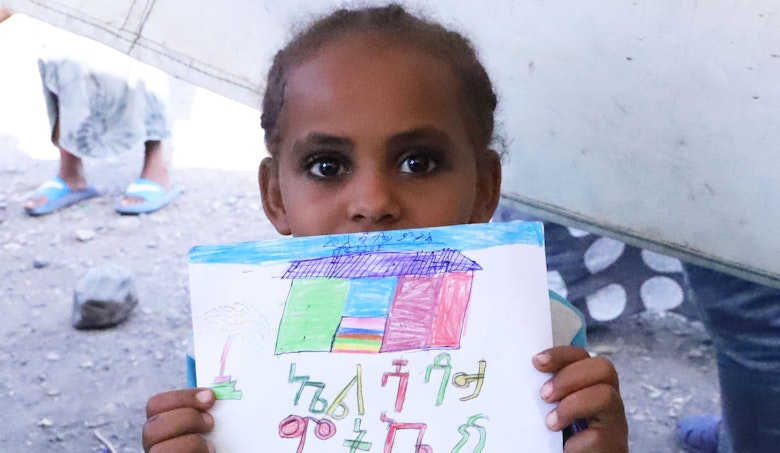Rapid humanitarian response in Ethiopia
The devastating conflict in the North Shewa Zone of the Amhara region has resulted in the displacement of approximately 500,000 people. As the humanitarian crisis grows, men, women, boys and girls face grave risks such as food shortages, risk of sexual violence & abuse, psychological trauma and displacement among others. To help people whose lives and livelihoods have been shattered by conflict, Terre des Hommes Netherlands is implementing a rapid response project, funded by IRC/USAID to provide comprehensive child protection services, SGBV prevention and response services as well as psychosocial support to the victims of conflict in the North Shewa Zone of Amhara region.
Girma Amentie
Programme manager Ethiopia:
Background
The conflict in the North Shewa zone in Ethiopia has claimed many lives, resulting in massive destruction of homes and infrastructure in addition to impacting the safety and well-being of hundreds of thousands of people. Educational institutions have been damaged and internally displaced children do not have access to education services. Furthermore, the conflict has exposed communities, especially women and children, to serious protection risks such as Gender-Based Violence, abuse and family separation.
A recent multi-sectoral assessment conducted by UNOCHA revealed the high prevalence of gender-based violence (GBV), lack of child protection (CP) as well as access to psychosocial needs (PSS). While the majority of the internally displaced persons (IDPs) are living with the host communities, those who are living in collective centres, especially girls are exposed to gender-based violence due to overcrowding and inadequate shelters. Some girls who are displaced in towns are at high risk of sexual exploitation, forced labour, abuse, and trafficking.
Many children experience stress and GBV risks when fleeing from their original homes. Also, some of the survivors have suffered psychological trauma due to the loss of family members, close relatives and property; coupled with challenges within the IDP sites. Some children/parents do not know where their parents/ children are living, while others are not sure whether they are alive. All these are causing psychological distress and unrest among the displaced children. The current situation and the lack of humanitarian assistance has forced the communities to use negative coping strategies. An example is the involvement of some women in “transactional sex” which exposes them to health risks.
Goals
This humanitarian response intends to offer integrated prevention and response services to GBV victims, child protection as well as psychosocial support to the most affected displaced people in North Shewa zone, Ethiopia.
Approach
With the launch of the 6-month humanitarian response project, Terre des Hommes Netherlands offers immediate protection services in Ataye, Debre Berhan, Efrata, Shewa Robit and Ansokia.
Latest news
Country Factsheets (Africa Region)
Our Country Factsheets provide an in-depth overview of our work across Africa, with a special focus on Kenya,…
Annual report 2023
In 2023, we collaborated with many stakeholders to work with us towards our ultimate goal; stopping child expl…
The Global Research Agenda
On February 1 2024, the Terre des Hommes Netherlands Global Research Agenda was launched, which will guide our…
Annual report 2022: concrete results for children
Thanks to the support of donors, in collaboration with partners and the commitment of volunteers and staff, Te…
Eldana's journey and dream to treat needy people in a conflict-prone area
Eldana sustained serious injuries after she was shot in the head when war broke out in their village in Ethiop…
Annual report 2020
Without a doubt 2020 is the year of the corona pandemic. And yet there is much to be proud of!
Annual Report 2019
Together we make the difference. A fitting title for our annual report 2019. We are proud of the results we re…
Partners
Terre des Hommes Netherlands will work closely with key stakeholders including Government departments of Women and Social Affairs, Disaster Preparedness and Prevention Center, Education, Health, Justice, Offices at Zonal and Woreda levels; and Civil Society Organizations working in the intervention areas.

